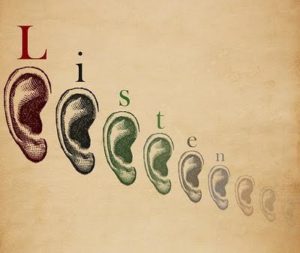
If you have Adult ADHD, listening can be difficult due to the symptoms of ADHD which can interfere with your listening skills. ADHD inattention may lead interruptions even though your emotions aren’t high. ADHD distractions may lead your mind to wander as your friend/spouse is telling you something important. Both of these scenarios can be frustrating if either one or both apply to you. Check out the strategies below & give one of them a try to help you improve your listening skills
Eye Contact – When it comes to becoming a good listener, it is important for you to have good eye contact with the other person you are talking with. This shows that you are paying attention & involved in the conversation. When you do not have good eye contact with the other person, it may show that you don’t really care or not very interested in what they have to say. Try practicing eye contact the next time you have a conversation with a friend/colleague/significant other.
Find Out the Why & the What – For you to become a good listener, you should figure out the “why” & the “what”. Why is this person talking to you & what is the message they are trying to convey with you. Becoming a good listener takes practice especially finding out the “why” & “what” from the other person; you will be much more engaged in the conversation.
Try To Limit Distractions – In order for you to be a good listener, try to limit the distractions during your conversation, whether it is the television, your cell phone, ect. How can you be a good listener if the television is on or if your phone continues to ring? It would be near to impossible with all those distractions. It takes a mental decision to limit those distractions when you are trying to have a conversation with someone especially if you have ADHD.
Engage – Engage yourself in the conversation. Being engaged in the conversation shows that you are paying attention to the person your talking to & it lets them know that they have your attention & focus. Show the person that you are talking to that you care about what they are saying. A way you can show this is by responding with short statements such as “yes” or “I understand”. This shows to the person you are talking with that you are truly listening.